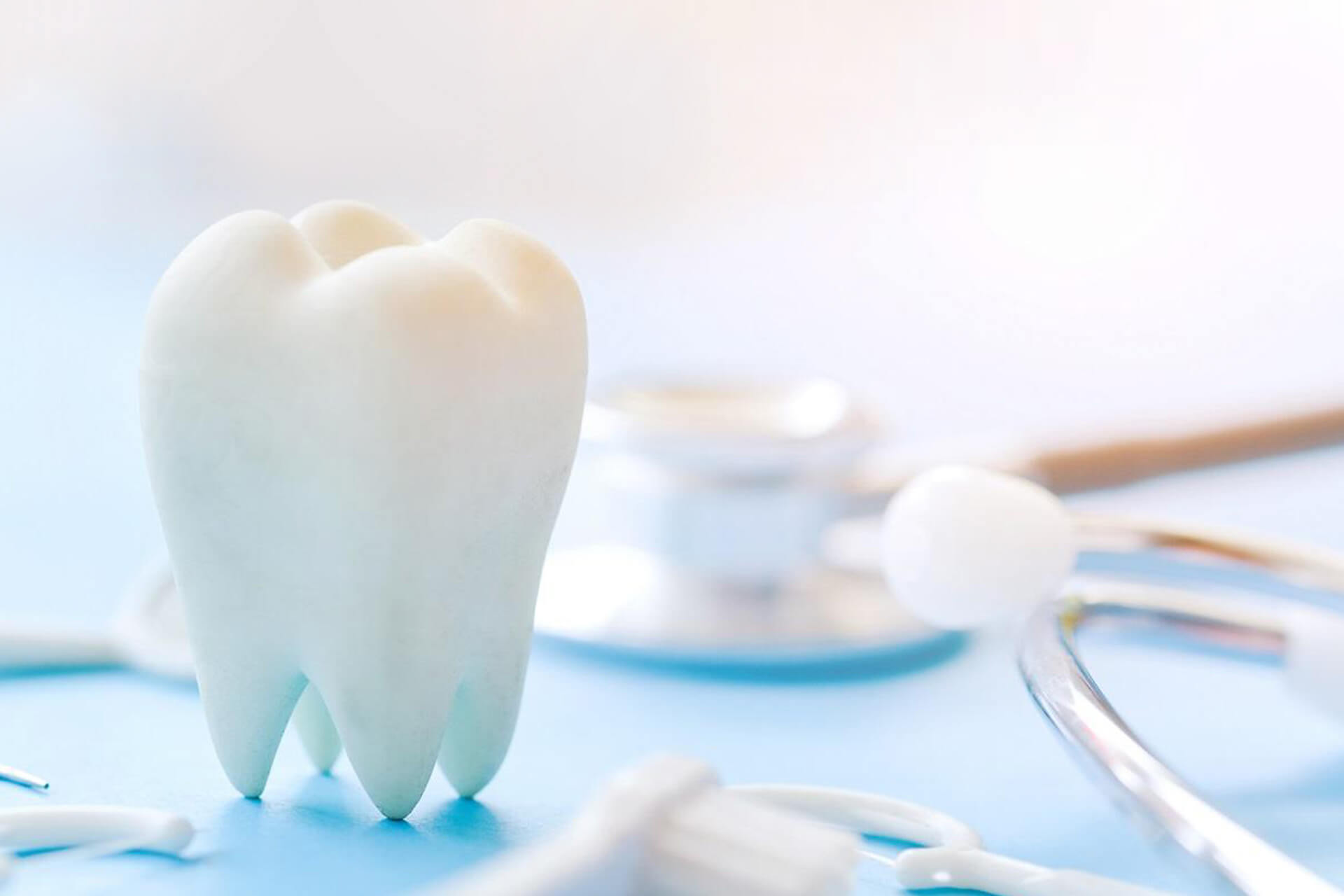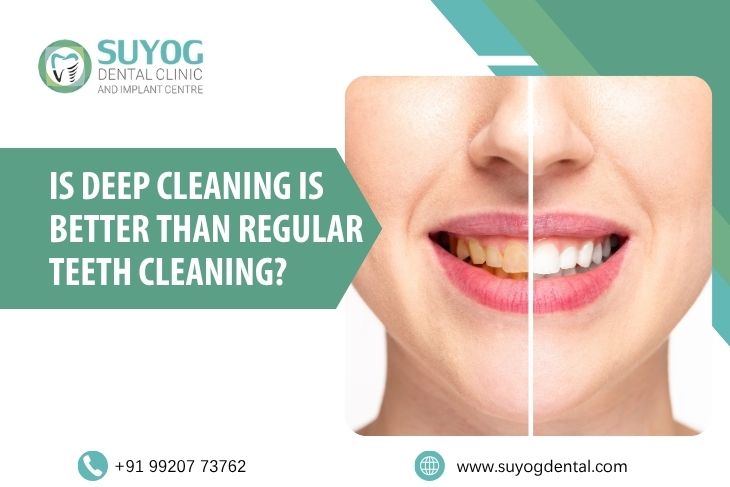
Is Deep Cleaning Is Better Than Regular Teeth Cleaning?
Let’s talk about something every Indian household knows well: doing the dishes.
After a simple meal, you rinse your plate, maybe scrub it lightly, and it’s good to go. That’s your everyday cleaning.

But when it comes to that heavy-bottomed kadhai with stubborn burnt masala stuck at the bottom? That’s not an ordinary job. It needs soaking, scrubbing, steel wool, and a lot more effort. That’s exactly how regular teeth cleaning and deep dental cleaning work.
At Suyog Dental Clinic, we often hear this question from patients: “Is deep cleaning better than regular cleaning?” And the answer is: it depends on your mouth, just like your dishwashing method depends on what you cooked.
Let’s break this down for you.
What Is Regular Teeth Cleaning?
Regular cleaning, or scaling, is a preventive procedure done during your routine dental check-up.
It removes:
- Soft plaque
- Tartar build-up above the gumline
- Mild stains from tea, coffee, or tobacco
It's usually quick, painless, and can be done in 20-30 minutes. We recommend it once every 6 months for most people with healthy gums.
Think of it as your plate rinse after dinner. Keeps things fresh, but only works if you do it regularly.
What Is Deep Dental Cleaning?
Also called scaling and root planing, deep cleaning is more advanced and necessary if you have:
- Bleeding gums
- Gum pockets (spaces between the tooth and the gum)
- Bad breath that doesn’t go away
- Loose teeth or gum infections
It removes plaque and tartar below the gumline, where normal brushing or regular cleaning can’t reach. The procedure is usually done in two sittings, under local anesthesia.
This is the kadhai-cleaning of dentistry – intensive, detailed, and essential when things have gone beyond surface-level dirt.
When Is Deep Cleaning Better?
Deep cleaning isn’t necessarily better for everyone. But if your gums are infected or inflamed, it’s not just better, it’s essential.
At Suyog Dental Clinic, here are common cases where we recommend it:
- Gum disease (gingivitis or early periodontitis)
- Patients with diabetes or weak immunity
- Those who haven’t had a cleaning in over a year
- Smokers with tartar build-up under the gums
If your gums are bleeding while brushing or flossing, don’t ignore it. It’s like seeing oil stains on your stove – there’s grime building up beneath.
Why Ignoring Deep Cleaning Can Cost You More
Many patients delay deep cleaning because it sounds intense or unfamiliar. But the cost of not getting it done can be much higher:
- Tooth mobility or loss
- Gum recession
- Expensive surgeries like flap surgery or bone grafting later on
Regular cleaning is maintenance. Deep cleaning is a repair. The longer you delay, the worse the damage.
Is Deep Cleaning Painful?
Not at all. We use topical anesthesia or numbing gels so you feel comfortable throughout the session. Some patients may feel slight sensitivity for a day or two, but nothing that interrupts daily life.
Our team at Suyog Dental Clinic uses gentle techniques and modern ultrasonic tools to make the procedure easy and efficient.
How Often Do You Need Deep Cleaning?
Deep cleaning is not needed as frequently as regular cleaning. Once done, it can protect your gums for 6 months to 1 year, depending on how well you care for your teeth afterward.
We usually call you for follow-ups and pocket depth checks to make sure the gums are healing well.
Let’s Talk Money: Teeth Cleaning Cost in Mahim
We know cost is a major concern. The teeth cleaning cost in Mahim depends on the type of cleaning you need:
- Regular cleaning: more affordable, preventive
- Deep cleaning: slightly higher due to multiple sittings, anesthesia, and equipment used
At Suyog Dental Clinic, we believe in transparent pricing and value-based care. We don’t oversell treatments – we only recommend what your gums truly need.
Remember, investing in timely deep cleaning can save you from root canals, surgeries, or even tooth loss later.
To get the exact teeth cleaning cost in Mahim, book an appointment with our expert at Suyog Dental Clinic.
Home Care After Deep Cleaning
After a deep cleaning session, your dentist will give you specific aftercare instructions. Here are some general tips:
- Use a soft-bristled toothbrush
- Rinse with warm salt water for a few days
- Avoid spicy or very hot foods for 24 hours
- Keep up with flossing and brushing twice a day
- Use any medicated mouthwash as prescribed
Your gums may feel a little different at first, but within a week or two, you’ll notice a fresher breath and firmer gum grip around your teeth.
Common Myths About Deep Cleaning
- Myth 1: It’s only for old people.
Truth: Gum disease can begin in your 20s. We’ve treated plenty of young adults who never got a cleaning done in years. - Myth 2: Teeth become loose after deep cleaning.
Truth: The teeth may feel loose because inflamed gum pockets shrink, revealing the actual condition. Deep cleaning doesn't damage your teeth – it saves them. - Myth 3: Once done, it never needs to be repeated.
Truth: Deep cleaning stops disease progression, but doesn’t guarantee it won’t return. That’s why follow-up is essential.
Which One Should You Choose?
It’s not a matter of better or worse. It’s about what your mouth needs right now.
- If your gums are healthy, go for regular cleaning twice a year.
- If you have bleeding gums, bad breath, or visible tartar under your gums, deep cleaning is your best friend.
At Suyog Dental Clinic, we’ll examine your gums, take X-rays if needed, and help you choose the right treatment. No pressure. No overselling. Just honest, personalized care.
So the next time you wonder whether to get a quick plate rinse or scrub that greasy kadhai, think about your teeth.
Frequently Asked Questions
1. What is the difference between regular cleaning and deep cleaning?
Regular cleaning, or scaling, removes plaque and tartar from the visible parts of your teeth and above the gumline, helping to maintain oral health and prevent disease.
Deep cleaning includes scaling and root planing, targeting plaque and tartar below the gumline and smoothing tooth roots to allow gums to reattach. It is recommended for gum disease, bleeding gums, or deep periodontal pockets.
2. Is teeth cleaning painful?
For most people, teeth cleaning is not painful—just slightly uncomfortable at times. You might feel minor sensitivity or tickling sensations, especially near the gum line, but nothing unbearable. If your gums are already inflamed due to plaque buildup, the cleaning might feel a bit more sensitive. Dentists use modern ultrasonic tools and gentle hand instruments to ensure comfort.
3. What happens during a professional dental cleaning?
A dental cleaning typically involves three main steps:
- Scaling: This removes hardened plaque (tartar) from above and around the gumline using ultrasonic or manual tools.
- Polishing: A gentle abrasive paste is used to buff away surface stains from tea, coffee, or tobacco.
- Fluoride (optional): Some dentists apply a fluoride gel or foam to strengthen enamel and prevent decay.
It’s a simple, non-invasive procedure that usually takes 30–45 minutes and leaves your mouth feeling fresh and clean.
Book your consultation at Suyog Dental Clinic and ask us about your options, including the most suitable plan and transparent dental cleaning cost in Mahim for your needs.
Because your smile deserves a clean start, inside and out.



